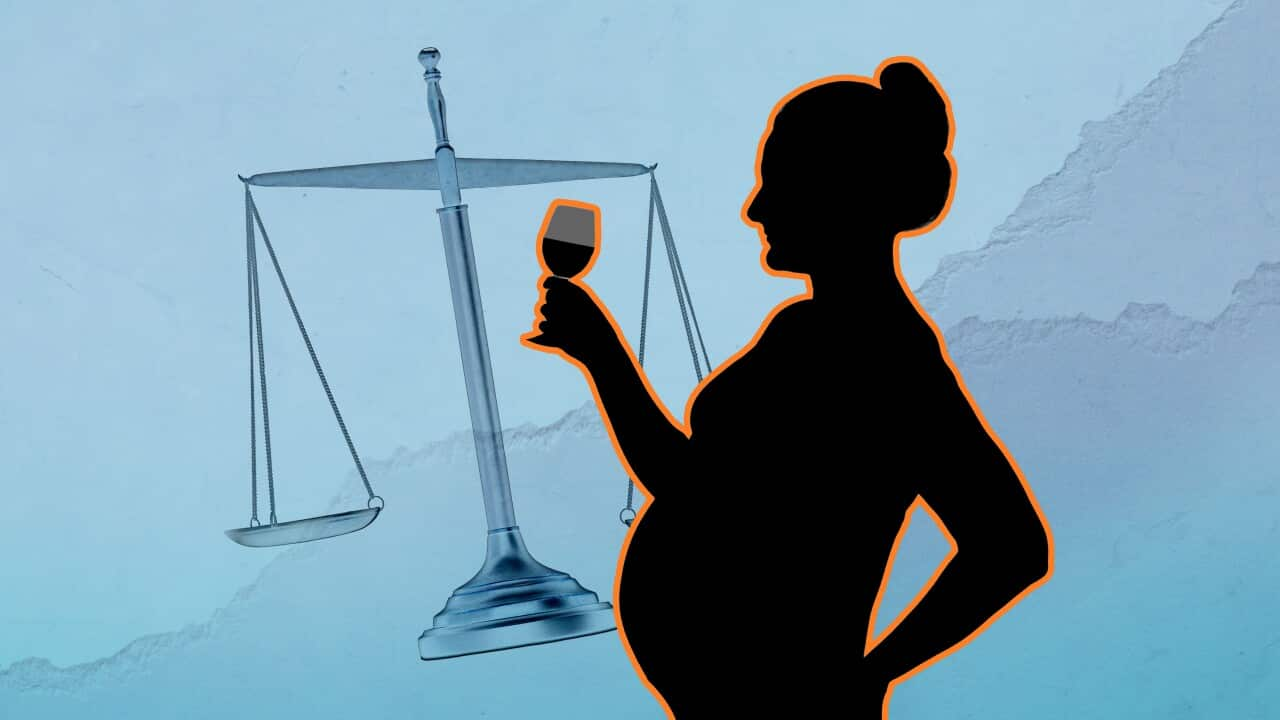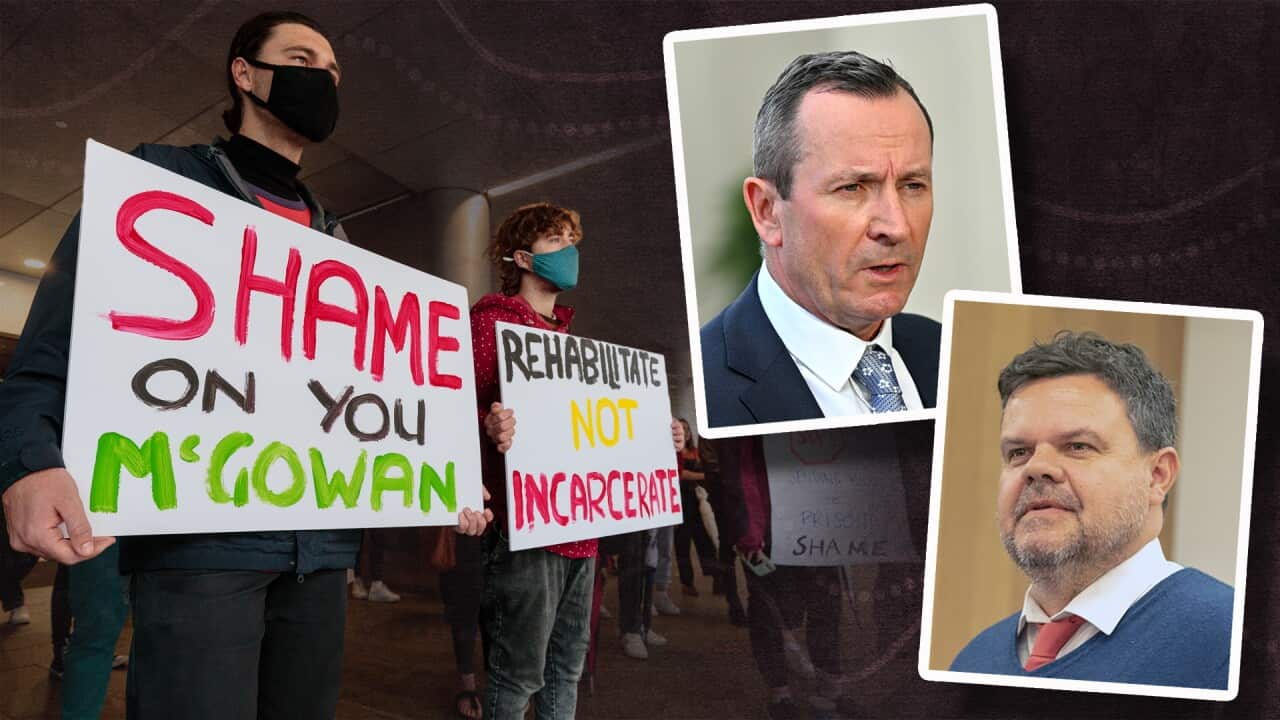In 2021, Beverly (not her real name) was arrested for stealing a purse from a woman’s house.
“I was really scared that I was going to go to prison for a year,” she said.
Her adopted mother Patricia (not her real name) told The Feed her daughter has been struggling with alcoholism, and her offending related to it.
Beverly, who lives in a large Australian city, has fetal alcohol spectrum disorder (FASD) and her symptoms include impulsiveness, memory loss and anxiety.
“It was during COVID and she had just gotten out of rehab and was struggling with alcohol again,” she said.
“She'd gone and knocked on some lady's door for a glass of water, the lady went to get a glass of water.
“Beverly saw the lady’s purse, went in and grabbed the purse. The lady came out and was worried that she was in the house and told her to leave.”
Patricia said she was caught on CCTV footage and her image was shared on Crime Stoppers' social media.
Someone who recognised Beverly called Patricia to let her know and Patricia's husband drove her down to the police station.
Beverly, 42, was charged with aggravated criminal trespass.
“Now I said right from the word go she had a disability. I didn't think she'd be competent to plead because of her receptive language impairments, which are quite severe,” Patricia said.
Beverly said: “Everything was so overwhelming I was really remorseful for what I had done. I didn’t understand what anyone was saying in the courtroom.”
Patricia said Beverly had a court-ordered assessment from a forensic psychologist and a forensic psychiatrist, both of whom said she was unfit to plead.
Ultimately the judge agreed and she is now awaiting to hear what the terms of her licence will be - it will likely mean Beverly will have to check in with a corrections officer and almost certainly abstain from alcohol for a period of time.
Experts say more needs to be done to diagnose FASD as well as take into account people in the criminal justice system with the condition.
What is Fetal Alcohol Spectrum Disorder?
FASD is a lifelong disorder that affects the brain. It can occur when a child is exposed to alcohol before birth.

As of 2020 Australia’s National Health and Medical Research Council (NHMRC) recommended mothers stop drinking alcohol from the moment they start trying to get pregnant.
These can include impaired judgement, poor executive function, lack of impulse control and learning difficulties.
There are no conclusive studies on how many people across Australia have FASD. Studies in the US and Canada have found that between 2-5 per cent of the population have the disorder.
'It’s a hard road each day’
Beverly has been with her adoptive mother since she was two years old.
She wasn’t diagnosed with FASD until she was 19 and it was from a specialist in Canada.
Beverly doesn’t know much about her mother other than that she had some big drinking issues, was very unwell and died in her forties, when Beverly was 10.
“We know through freedom of information records that on at least two occasions her birth mum was unconscious and collapsed in a hospital due to alcohol,” Patricia said.
“Her exposure would have been quite severe and she's far more easily addicted than somebody else because she's been prenatally exposed to alcohol.”
Beverly said that despite this she doesn’t blame her mum for drinking while pregnant.
“She didn’t have the help and support that she needed back in her day,” she said.
“It's very challenging (living with FASD) and is a hard road each day. Because I speak well and present well people think there is nothing wrong with me.
“I feel like we’re set up for failure and we don’t deserve it. We need more recognition of our disability.”
Overrepresentation of FASD in Australia’s juvenile justice system
Beverly's FASD was taken into account when she faced court. But it has been a different story for a number of inmates in juvenile detention.
A study, published in the UK-based Scientific Journal BioMed Central found adults with FASD were over-represented in Canada's prison systems - 31 per cent of inmates had FASD.
The only study to have taken place on an Australian prison population was the Banksia Hill Detention Centre Project. It assessed inmates at the Perth juvenile detention centre of the same name in 2018.
Of the 99 young people it assessed, 36 were found to have FASD.

The Banksia Hill Detention Centre project also found nearly 90% of inmates had some kind of neurological disorder
Eleven out of the 47 detainees involved in the riot had been diagnosed with FASD, Matthew Swinbourn, the parliamentary secretary representing the corrective services minister told Western Australia's parliament in the days following the riot.

There are growing calls for more testing for FASD in juvenile detention centres like Banksia Hill Detention Centre. Source: AAP / AARON BUNCH/AAPIMAGE
The premier’s response to the riots is symbolic of how the criminal justice system fails to acknowledge the needs of people with FASD, says Anne Cregan, a partner in the legal firm Gilbert + Tobin.
“The (criminal justice) system is based on an assumption that people are aware of what they're doing and the consequences of their actions," she told The Feed.

Former Western Australian Premier Mark McGowan. Source: AAP / Richard Wainwright
Ms Cregan said many of the symptoms of FASD can lead to people coming into contact with the justice system.
“Things like low impulse control, an impaired capacity to moderate behaviour. Difficulty recognising cause and effect and understanding the consequences of a person's actions, difficulty learning from previous experiences.”
Ms Cregan told The Feed that there’s exemptions in the criminal justice system for people experiencing an intellectual disability or mental health issue.
“But very often people with FASD will have an IQ in the normal range, may not have a diagnosed mental illness, and therefore they don't fit the definitions that allow their disability to be taken into account in the criminal justice system.”
Ms Cregan said it wasn’t until 2016 that a diagnostic criteria was developed for use in Australia.
“So it’s grossly under-diagnosed and there are very few people trained to diagnose FASD. It’s expensive too.”
Mandandanji woman Lorelle Holland is a FASD research collaborative PhD student at the Queensland University of Technology.

Mandandanji woman Lorelle Holland says there is no safe amount of alcohol consumption during pregnancy.
But there is support and testing for other neurological conditions such as ADHD.
“More testing of adult people within the prison system is not happening, it's only just starting to happen in young people,” Ms Holland said.
Ms Holland also said another barrier for getting children diagnosed with FASD was time and cost.
“They’re (FASD assessments) up to $3000, $5000 each and there was a three-year waiting list in the Queensland Children’s Hospital."
Patricia told The Feed her daughter had difficulty learning in school, where they treated her just as a naughty child.
Beverly said she felt like an outsider.
“The kids were very mean to me, I never got invited to any of their birthday parties, I always felt left out,” Beverly said.
Patricia said Beverly moved out of home in her late teens where she couch-surfed at friends’ places and lived with romantic partners.
“Every relationship she’s had until her current one has involved domestic violence. So she’s endured crisis after crisis,” Patricia said.
“She’s struggled all of her life maintaining employment.”
Beverly now lives in an apartment her parents bought for her.
Patricia said that she has had a number of other interactions with the law over “pretty impulsive stuff”.
“Very opportunistic things like throwing a rock through someone’s window, she had an altercation with a police officer when she was intoxicated.
“But she has never been charged for either of those things.”
Changing guidelines around drinking while pregnant
Lorelle Holland says there is no safe amount of alcohol exposure to an unborn child.
“You would never smoke a cigarette in a pregnant woman's space, so maybe we shouldn't be even drinking alcohol in front of her.”
Ms Holland also says there is a level of stigma and shame associated with drinking while pregnant that can act as a barrier for women to come forward and have their children assessed for FASD.
“I think there needs to be a certain element of normalising assessment and support and creating an atmosphere of compassion.”
In 2020 Australia’s National Health and Medical Research Council (NHMRC) recommended mothers stop drinking alcohol from the moment they start trying to get pregnant.
The NHMRC is the leading health and medical research body in Australia one of its duties is advising the government on health policies.
In 2001 the NHMRC reversed its position of zero alcohol, which had been in place since 1992, and recommended if women do drink that they have no more than seven standard drinks in a week.
It also recommended no more than two standard drinks in one day with at least two hours between them.
The recommendations were controversial at the time and were only accepted in full by three other organisations in Australia: the Western Australian Drug and Alcohol Office, the Tasmanian Department of Health and Human Services and the Australian Government Department of Health and Ageing.
All three of those organisations now recommend zero alcohol be consumed during pregnancy.

Australia's recommendations around alcohol consumption have changed over the years
Patricia says her daughter is in “the best place she’s ever been” but still requires a lot of support to keep her from relapsing and making risky choices.
“She can go down the road to her friend's house, who has a disability, and do some housework for her in exchange for money.
“We’ve got NDIS carers that also come in to look after Beverly when her partner’s at work.
“Sometimes I’ll fill the gaps in the schedule by face timing with her, for up to three hours.”
Beverly’s message for future parents is, “don’t drink while you’re pregnant”.
“People like us struggle every day and we’ve got a lot of other issues like drinking problems and memory problems that make it even more hard for us.”
If you or anyone you know may have FASD you can find more resources and support at NOFASD Australia.
Contact number: 1800 860 613













